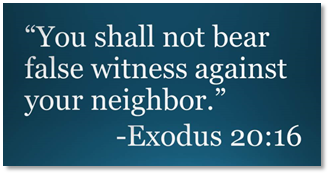 The video below is not new, but it is relevant. Among the profitable things in it, these men remind us how the ninth commandment must inform theological polemics. “You shall not bear false witness” means that you must represent your opponent’s view accurately. It also means that you must not confuse your opponent’s view with an alleged entailment of his view. You can warn about a potential entailment of his view, but you cannot legitimately accuse your opponent of holding the alleged entailment if he explicitly rejects it.
The video below is not new, but it is relevant. Among the profitable things in it, these men remind us how the ninth commandment must inform theological polemics. “You shall not bear false witness” means that you must represent your opponent’s view accurately. It also means that you must not confuse your opponent’s view with an alleged entailment of his view. You can warn about a potential entailment of his view, but you cannot legitimately accuse your opponent of holding the alleged entailment if he explicitly rejects it.
For example, I might believe that Arminianism entails open theism. Ethically, I am free to make the case that Arminianism entails open theism. But I am not free to accuse Arminians of being open theists–especially when my Arminian friends disavow open theism. I might argue that they are inconsistent, but I cannot rightfully charge them with open theism. If I did, I would be bearing false witness.
By the way, this works in reverse. My Arminian friends might believe that my view makes God the author of evil. They would be free to make the case that my view entails that God would be the author of evil. But they are not free to accuse me of believing that God is the author of evil–especially when I explicitly deny it. They might argue that I am inconsistent, but they cannot rightfully charge me with believing that God is author of evil. If they did, they would be bearing false witness.
The golden rule applies to theological polemics. Do unto others as you would have them do unto you. If you don’t want to be unjustly accused of holding a position that you do not hold, then don’t do that to others. Describe your opponent’s view fairly, and don’t confuse his actual view with what you perceive to be an entailment of his view.




6 Comments
GYB
But isn’t there a distinct–and important–difference between simply claiming I don’t support a point someone accuses me of supporting and actually being able to prove, theologically, that me believing x does not necessitate that I believe y?
For example, claiming one upholds the validity of eternal generation is not worth much if the theological position one takes, when actually applied, can in no way support a doctrine of eternal generation. It is kind of like Trump claiming he isn’t racist. It is fine if he wants to say that he is not racist, but simply claiming he isn’t a racist doesn’t free him from being racist.
Denny Burk
Hey, GYB. Thanks for comment. My comments policy requires first and last name. Looks like you’re a first-timer, so I’m letting this one through. Thanks!
James Anderson
If someone claims that Trump is a racist, it isn’t up to Trump to prove that he’s not a racist. The burden of proof lies with the one making the charge. Only once the charge has been supported with respectable argumentation, evidence, etc., does it fall to Trump to rebut the charge; even then, he’s only required to address that specific charge and its supporting argument.
Likewise, if Tom claims that Jerry’s theological position “when actually applied, can in no way support a doctrine of eternal generation,” the burden of proof lies with Tom to support that charge, not with Jerry to disprove it. Only once Tom has offered supporting argument is Jerry under any obligation to respond. And even then, Jerry only has to rebut Tom’s argument; he’s under no obligation to prove that his position *can* support a doctrine of eternal generation. (Of course, if he’s willing to go the extra mile and do so, that’s commendable!)
The presumption of innocence applies to theological debate as anywhere else.
Dan Phillips
1. Find an expert who says your view is the oldest.
2. Spike the ball, victory dance.
3. Insinuate (or outright state) that everyone else is a moron, a heretic, or possibly both.
…that’s not it?
Buzz English
Too Funny Dan
Pingback: